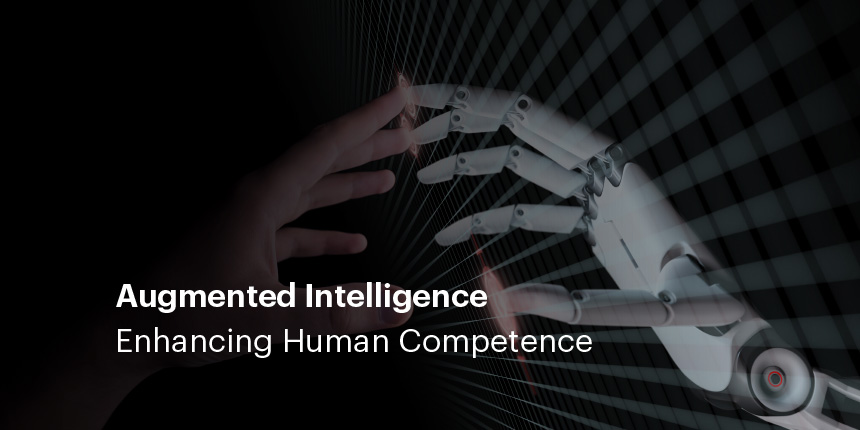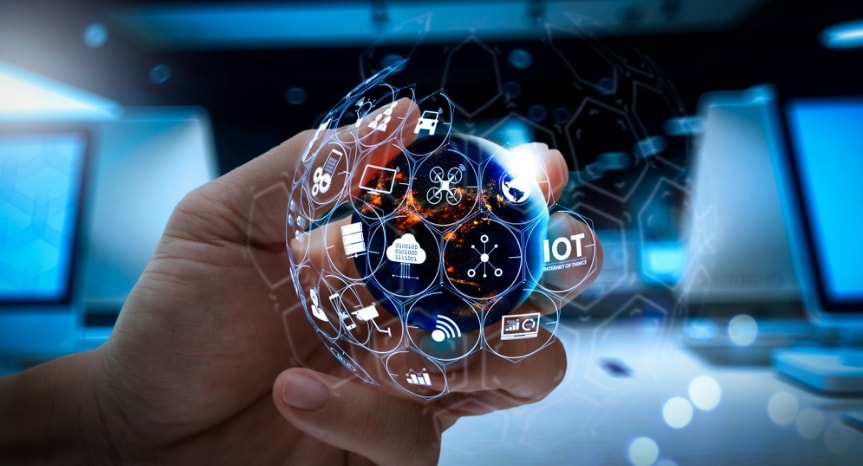Augmented Intelligence – What 2019 have for AI systems?

Admittedly, Artificial Intelligence or AI has gained a considerable amount of ill reputation from the public. There are a number of reasons for this infamy including the perception that AI is putting people out of jobs. But analysts and experts who have actually studied the pros and cons of AI-enabled systems have a different view. They actually believe that AI can have a substantially meaningful impact on human lives, hence the concept of Augmented Intelligence. The latter idea is centred around the fact that artificial intelligence is capable of actually helping human capabilities rather than replacing them. It focuses on the fact that these technologies can help people achieve better results in different tasks. This different and a fresher concept on AI can enable people to better understand the potential that AI has.
The misconceptions centred around AI are baseless due to the fact that the sort of super artificial general intelligence that is talked about by enthusiasts, does not exist yet. It is largely a part of sci-fi movies or books – it would probably take a mind stone and the genius of Tony Stark to create something like Vision or even Jarvis. Director of research at Google, Peter Norvig is of the belief that creating general AI is pointless, as there is no need for duplicating human intelligence. He goes on to stress that it is more important to create tools and machines that can work with humans to do things neither could do if they performed alone. There is more the need for augmented artificial intelligence than a super robot that can perform everything on its own.
Why Businesses Need Better Cognizance?
In 2018, AI worked with big data to uncover meaningful results and insights. It enabled businesses to process and analyse their millions of bytes of their raw customer data and provide them with useful knowledge about their customers and make better and more informed decisions. Still, this was the highlight of the previous year. In 2019, the idea is to build augmented intelligence for companies that can help in the development of firms that are driven by better wisdom as well as capabilities.
According to a report by Forrester, companies that are driven by insights would make nearly $1.8 trillion annually by 2021. Some of the world’s most dynamic companies including Netflix, Uber and Amazon use predictive analytics and consumer insights to enhance their operations and service offerings. This enables them to gain a competitive advantage and therefore improve their profits. Companies need to realise fast the potential their client data has for their business and how it can be used to improve their bottom lines.
Regardless, the same report goes on to indicate that currently only one in ten companies are driven by insights. This is mainly due to the lack of ability and deep-rooted legacy systems that are still prevalent in organisations. Moreover, a lot of companies also have isolated functions that have a significant lack of interaction amongst each other, and consequently, lack a mutual sharing of information. All these problems can be solved through augmented intelligence systems that can leverage data within a company and use it to provide meaningful insights.
The Role of Augmented Intelligence in Developing Improved AI Systems
As IT structures in companies become more advanced and the wave of digitisation hits day-to-day business operations, companies end up generating significant amounts of data. Another key player in this is cloud computing technology, that has enabled companies to move their entire data structures on cloud servers. But using this data to their advantage is an entirely different matter. Businesses now have available as simple information as how much time a user spends on their website or which products are being viewed most often.
Perhaps the most important role has been the proliferation of the Internet of Things or IoT. Sensors embedded in every possible system or electronic device have enabled the collection of health, traffic, weather data has become surprisingly effortless. Data from the simplest to most complex tasks performed by consumers can now be collected by enterprises to enhance their business operations including manufacturing, supply and customer services.
Systems based on artificial intelligence are therefore enabling businesses to gather the information that can help in breakthrough observations like indications of early signs of cancer, the cause of congestion in urban areas, detection of cyber attacks and fraudsters and enabling students to carve out better study plans. Detecting these patterns gaining insights from them is usually beyond human intelligence or rather requires months of research and analysis on the part of humans.

AI technologies are better equipped to handle and analyse large amounts of structured or unstructured data. Machine learning algorithms are designed to structure and analyse complex data. It can find patterns and details in user data that would require thousands of man-hours within seconds. The healthcare sector, for example, uses algorithms that can analyse a person’s symptoms and existing condition along with their medical history, thus providing doctors with the most likely diagnoses for their illness. Such systems can also take into account radiology images like CT scans and MRIs to identify tumours and other conditions within seconds.
Other applications of AI systems include applications in the education sector where both instructors and students can use such systems to learn more interactively. Applications are now available that can track students’ performance and analyse which of them are lacking behind. This enables teachers to better understand the needs and requirements of each individual pupil and therefore provide them with improved tutoring. For students, these systems can provide additional material and practice exercises that can enhance their learning, thus enabling them to improve their grades.
In the area of fraud detection, AI systems, built on the concept of augmented intelligence, are enabling businesses to deal with fraud and cybercrime proactively. Machine learning algorithms are being developed that use behavioural analytics and predictive analysis to detect patterns in purchase behaviour. This enables businesses, to detect fraudulent activity within seconds, thus allowing them to block such transactions in time and effectively. Other AI-based tools allow retail businesses, banks and financial service firms to detect fraud through online identity verification that uses document verification and facial recognition tools to verify and authenticate individual users.
Enhancing Human Capabilities Through Augmented Intelligence
Over the years AI systems have been developed that have been monumental in advancing human output as well as capabilities. The resulting functions have therefore been made unbelievably more proficient and productive. It, therefore, eliminates the concept that machines and computer programs are likely to replace humans. It also gives sustenance to the idea of augmented intelligence that is built on the concept that humans and machines can work collectively to achieve better results. AI-powered tools have enabled managers and executives to make more informed and real-time decisions. They have also provided remarkable insights into a consumer’s purchase behaviour and how they think. Some of the ways AI is empowering businesses include;
-
Improved Insights From Data
AI and machine learning algorithms use data gathered from customers to generate actionable insights that further enable companies to position their product or service more accurately and target and approach the relevant audience. Earlier on, such insights took years of research, data collection and analysis on part of companies or researchers. AI-enabled systems can generate these results and insights within minutes or even seconds.
-
Generating Leads
Modern and enhanced AI systems have also enabled businesses in the generation of leads by recommending suitable products and services for different customers based on their purchase behaviour, search history and browsing patterns. Augmented intelligence solutions can also read into competitors’ data and market trends to provide foresight for cross and upselling techniques, in addition to providing better knowledge into the customer’s minds.
-
Triggering Prompt Decisions
AI systems and solutions have also enabled fast and efficient decision-making process in companies. By providing the best course of action and recommendations based on consumer data, it has enabled managers and consumers to make fast and prompt decisions. The decisions made about the strategy, marketing, finance or IT are more informed and are backed by hardcore data.
It is no wonder that AI has only enhanced human capabilities. It is and will continue to enable businesses to process information intelligently, giving way to enhanced decision making and the development of a more powerful IT structure. It has enabled companies to provide more customer centric services and personalised value propositions. While AI-powered systems still need to be refined further for better performance, it is high time that humans accept their importance in the enrichment of businesses and daily life processes.
Shufti is built upon an ideal combination of artificial and human intelligence. It is an online identity verification service provider that provides fraud detection services to financial services institutions, e-commerce businesses, foreign exchanges, crypto companies and a number of other different businesses. It uses hybrid technology of AI and human intelligence for user verifications. It uses a document identity to verify end users through document verification. Users are further authenticated through facial recognition.
Shufti uses augmented intelligence for verification of customers enables businesses to make more responsible decisions. By using a combination of an AI system along with human experts that review the verification decision, Shufti eliminates the possibility of doubt. All verifications are performed under a minute thus eliminating the tradeoff of a slow and inefficient verification process.

 Explore Now
Explore Now













